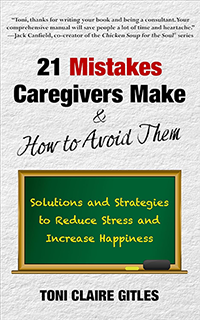 We are often thrust into a caregiving experience with a loved one. Often unprepared, overwhelmed feelings and stress can derail our life in an instant, while we use trial and error strategies to figure out how best to manage our new responsibilities.
We are often thrust into a caregiving experience with a loved one. Often unprepared, overwhelmed feelings and stress can derail our life in an instant, while we use trial and error strategies to figure out how best to manage our new responsibilities.
Using my 40 years of professional experience in the healthcare industry and 14 years of lived experience caring for my mom, I gathered the mistakes and lessons learned. I compiled them in 21 Mistakes Caregivers Make & How to Avoid Them. My book guides caregivers through common mistakes and empowers you to thrive in your roles with solutions, tips, and strategies to reduce stress and increase happiness. This overview will get you started transforming the mistakes into your success strategies.
1. You are Unprepared for a Health Crisis
You can expect to be a caregiver at some time in your life, but you haven’t had the important conversations with a spouse, parent, or sibling before a health crisis occurs. You don’t organize their health history, and you take your responsibilities as their caregiver for granted.
You can be blindsided by a diagnosis or a hospitalization that immediately becomes a medical crisis for the entire family, where emotions can run high. The stress you experience is compounded by your lack of confidence and fear of making a mistake or the wrong decision.
Take steps to prepare for a medical crisis by learning the medical history, medications your loved one takes, and physicians that care for your loved one so you can be a confident advocate and support person.
2. Everything Changes, and You Fail to Change
Maybe it’s not an emergency. You may notice warning signs of a problem physically, mentally, or emotionally, but you ignore them. Don’t wait. Have a calm and heartfelt conversation with your loved one about your concerns related to their health or abilities. Come from a place of love and support.
3. You Don’t Prioritize Your Well-Being
You don’t take care of yourself first, ask for help, or look for and find resources to support you and your loved one. When you begin helping a family member, your efforts may only require a few hours a week and you can balance competing priorities easily. As your duties intensify, you sacrifice your schedule for that of your loved one. Reclaim time, regain energy, and reset your priorities so your wellbeing rises to the top of the list. Locate help and resources to give you time to participate in the activities and family time that give your life meaning.
4. Ineffective Communication Skills
You fail to find out what your loved one needs and wants and how family and friends can help, and you settle for an incomplete understanding of doctor’s orders and explanations. You may need to learn new interpersonal skills and ways of communicating with friends, family members, and your loved one. Communication with doctors and healthcare professionals takes a new level of preparation and finesse. Lead with love and curiosity, make direct requests, and find your voice. You will learn to confidently advocate for your family member.
5. Not Planning for an Uncertain Future
Your loved one doesn’t have legal documents in order, and you are unaware of your loved one’s financial information. While sensitive, start the conversation to understand your family member’s current financial and legal situation and their wishes for the future. Always consult with professionals to understand the options, make better choices, and be empowered to advocate for your loved one.
6. Dismissing Happiness and Celebrating Life
You put your life on hold and cease or question your connection and guidance with a higher power. Unknowingly, you undervalue giving and receiving love in your relationships. With intention and strategy, you can be happy even during some of the most challenging circumstances. Look for new ways to receive and give love and celebrate life and your loved one each day.
Using the solutions to these mistakes, create your own dynamic caregiving plan, which will relieve stress and some uncertainty. Take control of the things you actually can control. In caregiving, as in life, things don’t always go as planned. Your reaction and attitude influence your experience.
For more information, visit heartofcaregiving.com. Toni’s #1 international best-selling book, 21 Mistakes Caregivers Make & How to Avoid Them: Strategies and Solutions to Reduce Stress and Increase Happiness, is available on Amazon.com.

